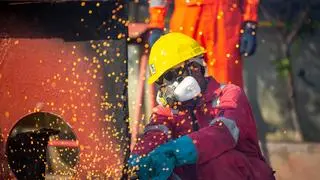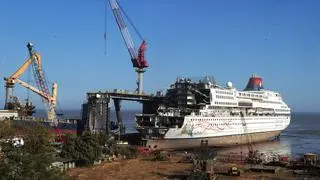Green steelmaking leverages an electric arc furnace fuelled by renewable energy. The phased withdrawal of coal-fired induction gas furnaces is imperative as the steel sector contributes 8 per cent of carbon dioxide emissions. Green steel is also made using a ferrous scrap mix in the raw material chain to ensure a proportionate reduction in carbon dioxide emissions. The other option entails direct reduction of iron using hydrogen or natural gas and melting the reduced iron to steel.
Steel decarbonisation was widely discussed at the recently concluded 29th conference of the parties to the United Nations Framework on Climate Change (COP29) in Baku, Azerbaijan.
Scrap-based electric arc furnaces are said to cut up to 75 per cent of carbon dioxide emission; moreover, scrap usage is widely seen as a cost-effective alternative to hydrogen- or natural gas-based reduction techniques for decarbonised steel production in developing and emerging economies.
The major sources of scrap are dismantled automobiles and ships; green think tanks mooted the idea that enhanced ship recycling in South Asian nations like Bangladesh (port of Chattaogram), Pakistan (Gadani, near Karachi port), and India (Alang in Gujarat) will provide scrap for steel making in their respective countries. These yards equally divide the ship recycling market between them.
Polluters don’t pay
Ship recycling, however, is one of the most polluting sectors with utmost disregard for human life and safety.
To escape the liabilities of environmental and labour laws, major European ship owners sell their vessels for cash to brokers located in Marshall Islands, Panama, Cyprus, and other locations where a ‘Flag of Convenience’ (FOC) is allowed — namely a business practice where a country allows a foreign vessel to fly its flag. FOC ensures that the ship’s original European owner is not held accountable for the pollution. Scrap yards in India, Pakistan, and Bangladesh buy these FOC ships from the brokers in cash. Alang, for instance, was dismantling around 400 ships before demonetisation in 2016, with a thriving secondary steel market.
In was against this backdrop that the Hong Kong Convention for Safe and Environmentally Sound Recycling of Ships was adopted at a diplomatic conference in Hong Kong in June 2009. The convention laid out environmentally safe practices for ship dismantling. Similarly, the European Union passed a regulation in 2013, mandating ships to list hazardous materials present on board while calling at ports of EU member states.
The HK convention, which is ratified by the Indian government, will come into effect by June 2025 while the EC convention is in effect since 2018. The HK convention applies to Indian ship recycling yards, hence 50 per cent of the yards in Alang have been certified as compliant by agencies like Lloyds registrar.
Evasive rule
It is amid these developments that the so-called opportunity for green steel production through ship recycling in India is being promulgated by some Western nations. However, it must be noted that the HK convention focuses on safety standards only, and do not insist on completely avoiding dismantling through ‘beaching’, which is the normal practice at yards in South Asia, whereby ships are dragged to environmentally sensitive beaches and dismantled, unlike the dry dock method adopted elsewhere.
The takeaway here is that the shipowners, who are predominantly from Western nations, evade responsibility for pollution by selling their vessels to cash buyers in nations that allow FOC. These vessels come to India and are beached and dismantled at the cost of our environment.
The HK convention, even if it comes into effect in 2025, does not prevent beach dismantling but only requires the yard to prepare a dismantling plan, list the hazardous materials and safely remove them, and focus more on health and worker safety.
In this context, unless yards in India are re-designed as dry docks and European ships directly dock here without a middleman (the owners take responsibility for the pollution), it may not ensure environmental sustainability. India would be better off focusing on alternative methods for green steel production rather than relying on a ship’s recycled ferrous scrap, as pushed by the global North.
(The writer is a maritime expert)







Comments
Comments have to be in English, and in full sentences. They cannot be abusive or personal. Please abide by our community guidelines for posting your comments.
We have migrated to a new commenting platform. If you are already a registered user of TheHindu Businessline and logged in, you may continue to engage with our articles. If you do not have an account please register and login to post comments. Users can access their older comments by logging into their accounts on Vuukle.